Overkill Motorsports Products
Product Listing -- Overkill Pentastar Tuning
| Overkill Pentastar Tuning for Dodge/Chrysler/Jeep | |
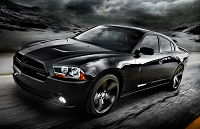  |
Description: It's with pride to be a premier tuner for the Chrysler Corp 3.6 Pentastar V6. The Pentastar is a terrific engine, and with Overkill tuning through Diablosport tuner products it can reach its potential. I'm often asked how my tuning compares to other custom tuners. While its too difficult to compare to brand x or brand y custom tunes (because I honestly just don't go scouting my competitions work like that), I can give examples of what I do in my tuning that I'm confident others don't take the time to do, and I can compare to the Diablosport preloaded tunes which people can run and not understand how much is still left to gain with Overkill tuning. One of the most important aspect is that each tune is custom written by hand. When you use your Diablo handheld, the way that it makes the tune is using what they call a CalFile; this is a list of changes that is grafted onto your original backup to make the Diablo tune. If you've ever seen someone say that they emailed their stock tune to someone and gotten it back in a couple minutes and wow that was quick and so awesome, well they're just using a CalFile method as well, though perhaps with their own editing revisions. The reason this is bad is that the mapping in tune files changes from year to year. Even in the preloaded tunes, I've seen such inconsistencies in what they change, and this is because tables can change and mapped with different X and Y axis so the changes are now invalid, or new parameters become available, or old parameters aren't available anymore. Overkill tuning does each change by hand; I may copy and paste but I go through table to table to make and verify each change. It takes a while to do by comparison but its the proper way to do it!! And now to some more technical explanations of Overkill revisions... The first example is the spark timing advance. With Overkill timing, I reengineer the main timing table from low rpm initial throttle tipin to high rpm full throttle blasts. Every cell is touched. My reason for doing this is I often want more consistent spark delivery than the factory tuning, which provides more consistent timing advance at cruise, smoother spark delivery at part throttle resulting in stronger smoother acceleration in regular driving, and of course stronger full throttle acceleration with more consistent timing resulting in reduced engine knock. Here's my timing advance table versus the Diablo tune on a 2013 Avenger, and keep in mind that colour denotes a revision to the table in that cell, no change results in no colour and just a white cell, so even though I've blurred my settings on purpose you can see that the amount of revisions I make are substantial... 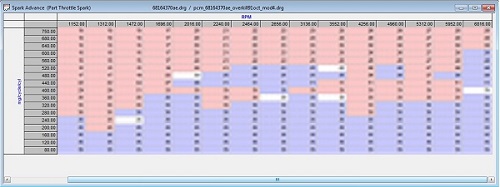 Here's an example of an item that I, as far as I know, am the only one doing, as I've never seen anyone else address or attempt to address. The fuel injector calibration from factory is very odd. The table is populated as such that only a few of its cells fall within the normal operating range of the fuel injectors. As such, the computer must make its fuel calculations based on injector fuel flow data from very far reaching points. Meanwhile there's plenty of room in the table to revise the calibration and increase the resolution in the regular operating range, so that's what I've done. Now the computer can take much shorter calibration intervals to calculate fuel injector flow, and do its calculations from there. Now if that sounds complicated, perhaps this graph will help and take note of the circled points, those are fuel injector calibration points compared... 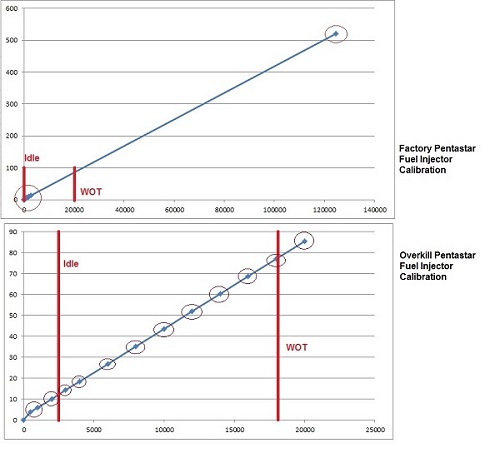 The Pentastar has a very naughty calibration from factory and that's the electronic throttle. It's very overboosted at part throttle, to make the car feel faster by having to use less throttle, but reality is it's just a mind trick, moving your foot on the accelerator more would achieve the same result. This also uses a lot of fuel. And its made worse with Diablo tuning, where they bump up the throttle rate even more, again to give the impression that the car is faster. As part of Overkill tuning and improving the fuel and spark delivery, the engine will produce more torque at part throttle. This improves acceleration by actually improving engine power output through better efficiency, rather than artificially with the throttle tables. As such, and because I hate the feel of overboosted throttle, I reslope the throttle curve to reduce its opening rate for the first half movement of the pedal. The vehicle will still feel strong and responsive due to the increase in torque, but the throttle body will open more slowly during this throttle travel. While some will initially find it odd, the way that it changes how the vehicle feels compared to how you're used to, you'll quickly adjust because the throttle feel is more natural, easier to control and modulate. Also you'll see a gas mileage improvement, because although the vehicle still feels torquey and strong at part throttle with other Overkill revisions, the throttle body is opening less: less throttle opening = less air to the engine = less fuel = better fuel mileage. Simple formula. Here's the graphs so you can get a better idea of what I mean... 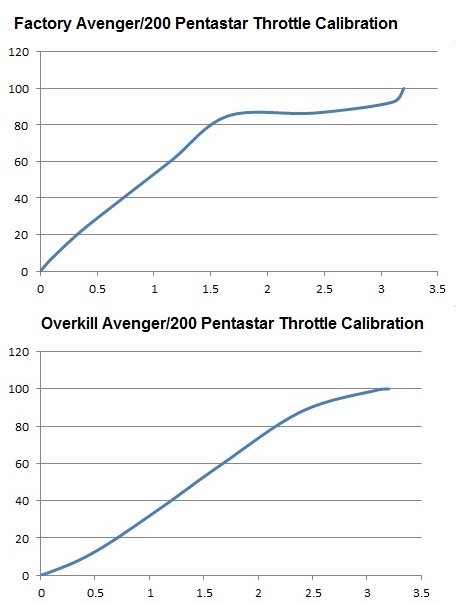 Finally, here are some real world results. First is a dyno graph, which will show that at peak 6000rpm the power gain was 8 wheel horsepower, however at 5300rpm the gain was 20+ wheel horsepower, and the gains were increasing back towards 5000rpm. This was on a stock 2014 Chrysler 300 8-speed running 91 octane, no other mods, with final output measured at 261 wheel horsepower. I'm hoping to get another dyno graph showing the power difference in the midrange, using an Avenger or Charger/300 with autostick... 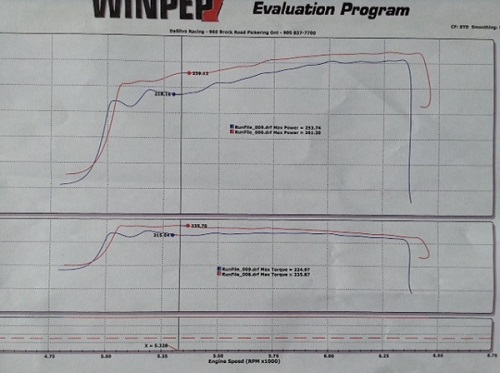 And here's a couple videos created by our customers, showcasing the acceleration difference on first a 2011 Charger and second a 2014 Avenger, both with some mild bolton mods to compliment. Note the back to back time difference on the Charger and how the acceleration on the Avenger is just plain awesome... Overkill Pentastar Tuning |